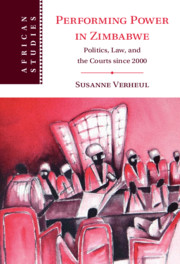Book contents
- Performing Power in Zimbabwe
- African Studies Series
- Performing Power in Zimbabwe
- Copyright page
- Dedication
- Contents
- Figures
- Acknowledgements
- Abbreviations
- Introduction
- 1 History, Authority and the Law in Zimbabwe, 1950–2002
- 2 ‘Rebels’ and ‘Good Boys’
- 3 ‘Zimbabweans Are Foolishly Litigious’
- 4 ‘What Is Abnormal Is Normal’
- 5 Material and Sensory Courtrooms
- 6 The Trials of the ‘Traitor’ in Harare’s Magistrates’ Courts under the Unity Government
- 7 History, Consciousness and Citizenship in Matabeleland
- 8 Historical Narrative and Political Strategy in Bulawayo’s Magistrates’ Courts
- Conclusion
- Bibliography
- Index
- African Studies Series
7 - History, Consciousness and Citizenship in Matabeleland
The Impact of the MLF Case
Published online by Cambridge University Press: 31 August 2021
- Performing Power in Zimbabwe
- African Studies Series
- Performing Power in Zimbabwe
- Copyright page
- Dedication
- Contents
- Figures
- Acknowledgements
- Abbreviations
- Introduction
- 1 History, Authority and the Law in Zimbabwe, 1950–2002
- 2 ‘Rebels’ and ‘Good Boys’
- 3 ‘Zimbabweans Are Foolishly Litigious’
- 4 ‘What Is Abnormal Is Normal’
- 5 Material and Sensory Courtrooms
- 6 The Trials of the ‘Traitor’ in Harare’s Magistrates’ Courts under the Unity Government
- 7 History, Consciousness and Citizenship in Matabeleland
- 8 Historical Narrative and Political Strategy in Bulawayo’s Magistrates’ Courts
- Conclusion
- Bibliography
- Index
- African Studies Series
Summary
Chapter 7 situates the founding of the Mthwakazi Liberation Front (MLF) within regional and ethnic politics to examine the formation of a local human rights network, Abammeli. When the MLF leaders were charged with treason, Zimbabwe Lawyers for Human Rights (ZLHR) lawyers based in Harare rejected the MLF case, despite the fact that it was working as the leading defence council in the Gwisai treason trial at that time. Formed as a response to ZLHR’s refusal to defend the MLF leaders, Abammeli’s formation highlights how the historical place of law shaped legal and state consciousness in Matabeleland. Abammeli’s lawyers positioned themselves first and foremost as residents in, and citizens of, Matabeleland, and they articulated an understanding of citizenship that granted legitimacy to law if it protected a shared humanity, rather than a specific political agenda.
Keywords
- Type
- Chapter
- Information
- Performing Power in ZimbabwePolitics, Law, and the Courts since 2000, pp. 181 - 205Publisher: Cambridge University PressPrint publication year: 2021

